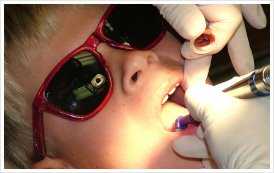Best Dental Treatments for Children at Morris Family Dentistry

Kids are some of the best dental patients. When they have positive expectations about the dental office experience they are a joy to work with. At Morris Family Dentistry we want our young patients to have a good experience that will prepare them for a lifetime of successful dental care. Unfortunately, when someone has had a bad dental experience as a child this can create anxiety about the dental treatment that lasts into adulthood. Let’s work together to give our children the best dental experience possible.
Prevention is the Key
The best and easiest dentistry you can provide for your kids is to help them prevent cavities. Tooth decay is the most common disease in children. Begin brushing your child’s teeth as soon as the first teeth are visible. Toddlers should brush on their own, then allow the parent to brush afterward. How old does will a child be before they can brush without a parent’s help? Brushing is a fine motor skill that takes at least as much dexterity as tying your shoes. Usually, around age five or six a child will have the necessary coordination to brush their teeth independently. Like adults, children should brush at least twice a day.
Children that do not spit should use fluoride-free toothpaste. Once a child learns to spit switch to fluoride toothpaste.
After the bedtime brushing, don’t let your child eat anything or drink anything but water. Even a bedtime bottle of milk can cause cavities.
Limit sugar in your child’s diet (soda, candy, cake, cookies, juice boxes, etc.) to reduce the risk of cavities.
Dental Appointments
A child’s first dental appointment should be around the time their first tooth erupts. These early appointments (age 1-3) help the child get used to the dental office and will teach them how to take good care of their teeth. These are intended to be educational, prevention appointments. Parents will be involved in early appointments because the child feels comfortable sitting on the parent’s lap while the dentist examines their mouths.
Should I be in the room during my child’s appointment?
At my office, parents are always welcome in the treatment room with their children. However, if you feel anxious, a child can sense this, and they may be more likely to act out. You may choose to wait in the waiting room. Parents will always be informed of each appointment’s treatment. If there is any problem during an appointment, we will notify you immediately.
I never do dentistry on a child who is apprehensive or uncooperative. I do not restrain or force children to receive treatment.
After a successful dental visit, we reward children with stickers or other prizes.
Children are at their best and brightest in the morning. They are most likely to behave well during mid-morning appointments.
Other Useful Facts
The baby teeth erupt from birth to age two and a half. Permanent teeth erupt from age six to 18. While this is usually a painless process, some tooth eruption causes soreness or pressure pain. Tylenol or Motrin are effective to minimize any discomfort from erupting teeth.
Baby teeth are important for many reasons. Healthy teeth allow your child to eat a full, healthy diet and help in proper speech development. Baby teeth hold a space for the permanent teeth to erupt later. If a baby tooth is lost too early due to decay and extraction, the permanent teeth may be crowded and require braces. In the event of early baby tooth loss, a temporary space maintainer is recommended.
The best preventive treatment a child can get includes regular cleanings with fluoride, and sealants put on the grooves of the back permanent teeth as soon as they erupt.
Thumb-sucking and pacifiers are normal habits from birth to age 4. These habits should be broken by age 4 (well before the permanent teeth begin to erupt). Talk with me if you need tips on breaking these habits. After age 4 the negative consequences of thumb sucking may be crooked teeth and jaws, an incorrect bite that makes eating difficult, speech problems, or mouth breathing which can lead to poor jaw development, poor sleep, bad breath, gum disease, sleep apnea, poor immune system, poor health, and poor athletic ability.
If we help our children feel positive about their teeth and the visits to the dental office, they are much more likely to keep their teeth healthy for a lifetime.
